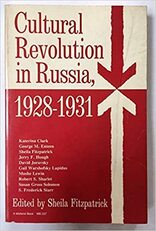|
This is an excerpt from Cultural Revolution in Russia, 1928-1931, Sheila Fitzpatrick, editor, Indiana University Press, 1984, pp. 89-92.  The long American descent into Marxism is reminiscent of the 1920’s Soviet Union as the Bolsheviks consolidated their revolution and restructured culture and society. In the late 1920s the term “cultural revolution” was redefined to mean aggressive class war, considering it anti-revolutionary to accept cultural change as a peaceful, evolutionary process. Stalinists adopted this class warfare, as opposed to class conciliation, official Party policy. Further, in education, “credentialism” became official policy as non-Party indoctrinated faculty were purged, library shelves examined for books by anti-revolutionary authors, and research grants awarded only for ideologically-pure scholarship. The Fifteenth [Communist] Party Congress held in December 1927 had called for the mobilization of economic resources on behalf of industrialization . . . and a greater share of resources for educational programs. The new political climate affected educational institutions and policies . . . [as it] touched off a vast wave of purges at all levels of the educational system, which [conservatives] tried in vain to halt. At institutions of higher learning widespread purges of faculty and students were accompanied by drives to enhance ideological purity. At Smolensk State University the Cultural Revolution was launched in the spring of 1929. Party organs forced the replacement of key administrators with trusted Party figures and ordered the new leadership to improve the social composition of the student body, to communize the leading organs and scientific workers of the university, and to create conditions “which would aid to the maximum the task of training cadres of real builders of socialism.” Party members now dominated the governing board of the university as well as the faculty of social sciences . . . [and were encouraged] to press forward with expulsions of “socially alien and hostile students and reactionary scientific workers.” Further purges of “reactionary” faculty followed. Massive expulsions of students of intelligentsia and bourgeois origins took place . . . to increase the representation of students with proletarian background. The extension of rabfaks [worker’s faculty] designed to prepare poorly educated workers for entrance into the university and the effort to recruit students of designated social background or political affiliation to fill assigned quotas began to have a dramatic impact on educational statistics.” This excerpt was previously featured on Circa1865.com on May 15, 2021.
0 Comments
Leave a Reply. |
AuthorBernard Theursam is an architect from Wilmington, North Carolina. Though he was born in New York, there is no better Southerner anywhere. He frequently shares with others gems from his immense library of materials about good Confederates and bad Yankees. Archives |
Proudly powered by Weebly
